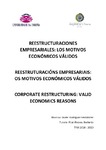Mostrar o rexistro simple do ítem
Reestructuraciones empresariales : los motivos económicos válidos
| dc.contributor.advisor | Álvarez Barbeito, Pilar | |
| dc.contributor.author | Rodríguez Fernández, Javier | |
| dc.date.accessioned | 2020-12-22T14:55:49Z | |
| dc.date.available | 2020-12-22T14:55:49Z | |
| dc.date.issued | 2020 | |
| dc.identifier.citation | Rodríguez Fernández, Javier, Reestructuraciones empresariales : los motivos económicos válidos. Traballo Fin de Mestrado. Facultade de Dereito, Universidade da Coruña, 2020 | es_ES |
| dc.identifier.uri | http://hdl.handle.net/2183/27014 | |
| dc.description | Traballo Fin de Mestrado (UDC.DER). Mestrado Universitario en Avogacía. Curso 2019/2020 | es_ES |
| dc.description.abstract | Las grandes operaciones de reestructuración patrimonial gozan en la actualidad de un marco regulatorio tendente a facilitar las mismas mediante la concesión de una importante ventaja tributaria. Sin embargo, una cláusula antiabuso en la misma ley permite al Fisco rechazar la aplicación de esa bonificación si con la operación únicamente se está persiguiendo el ahorro fiscal. Desde que esto es así, la batalla legal estaba servida, pues dicho mecanismo ha supuesto un arma de doble filo: para el contribuyente ha sido, y es una herramienta fundamental para reducir la carga fiscal todo lo posible dentro del amparo de la ley, y por otro lado le ha proporcionado a la Agencia Tributaria una potestad discrecional añadida, de valorar las intenciones reales del contribuyente, con la que poder endurecer sus procedimientos de comprobación y regularización. | es_ES |
| dc.description.abstract | Large capital restructuring operations currently have a regulatory framework to facilitate them by granting a significant tax advantage. However, an anti-abuse clause in the same law allows the Treasury to reject the application of hat bonus if only tax savings are being pursued with the operation. Large capital restructuring operations currently have a regulatory framework to facilitate them by granting a significant tax advantage. However, an anti-abuse clause in the same law allows the Treasury to reject the application of that bonus if only tax savings are being pursued with the operation. Since this is so, the legal battle was served, because this mechanism has meant a double-edged sword: for the taxpayer it has been and is a fundamental tool to reduce the tax burden as much as possible under the protection of the law, and, on the other hand, it has provided the Tax Agency with an additional discretionary power to assess the real intentions of the taxpayer, with which to be able to tighten their verification and regularization procedures. | es_ES |
| dc.language.iso | spa | es_ES |
| dc.subject | Cláusula antiabuso | es_ES |
| dc.subject | Fraude fiscal | es_ES |
| dc.subject | Impuesto sobre Sociedades | es_ES |
| dc.subject | Reestructuración empresarial | es_ES |
| dc.subject | Planificación fiscal | es_ES |
| dc.subject | Neutralidad | es_ES |
| dc.subject | Economía de opción | es_ES |
| dc.subject | Motivos económicos válidos | es_ES |
| dc.subject | Anti-abuse clause | es_ES |
| dc.subject | Tax fraud | es_ES |
| dc.subject | Corporation tax | es_ES |
| dc.subject | Corporate restructuring | es_ES |
| dc.subject | Tax planning | es_ES |
| dc.subject | Neutrality | es_ES |
| dc.subject | Economy of choice | es_ES |
| dc.subject | Valid economic reasons | es_ES |
| dc.title | Reestructuraciones empresariales : los motivos económicos válidos | es_ES |
| dc.title.alternative | Reestructuracións empresariais: os motivos económicos válidos | es_ES |
| dc.title.alternative | Corporate restructuring: valid economics reasons | es_ES |
| dc.type | info:eu-repo/semantics/masterThesis | es_ES |
| dc.rights.access | info:eu-repo/semantics/openAccess | es_ES |
| dc.description.traballos | Traballo fin de mestrado (UDC.DER). Mestrado Universitario en Avogacía. Curso 2019/2020 | es_ES |






